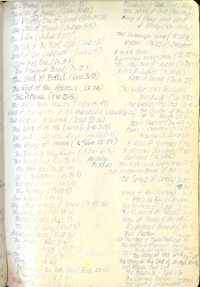Take this test of basic Bible knowledge to help assess your biblical literacy. This simple quiz examines some of...
Tag Archive for: Bible Emails
1. Who wrote the first four books of the New Testament? Answer 2. Who wrote the first five books...
July 21, 2011 Dear Renea, We are a strong, white, Christian family. Our 22 year old daughter is dating...
Have you noticed how many blank pages you can find at the back of your Bible? I don’t know...
How do I know that the Bible was true, since I base my faith on it? Why weren’t some...
I came across your website and looking for first-hand eyewitness evidence of Jesus’ ministry. I wish to quote a...
One of the Jehovah’s Witnesses’ arguments is that if Lazarus was dead and his soul was in Heaven, why...
When you suddenly learn you might have only 18 months to live, its a good time to sort out...
Genesis: 1:29: “And God said , behold, I have given you every herb bearing seed, which is upon the...
I was wondering about some matters pertaining to truth, specifically the truth of the Bible and existence of God....






